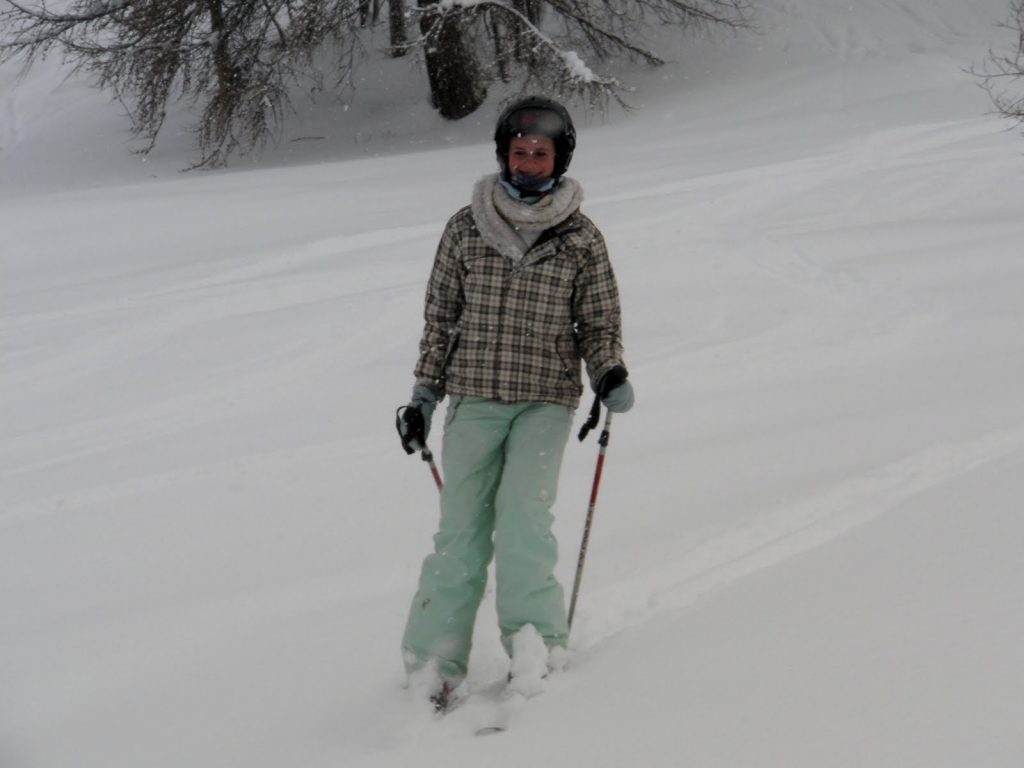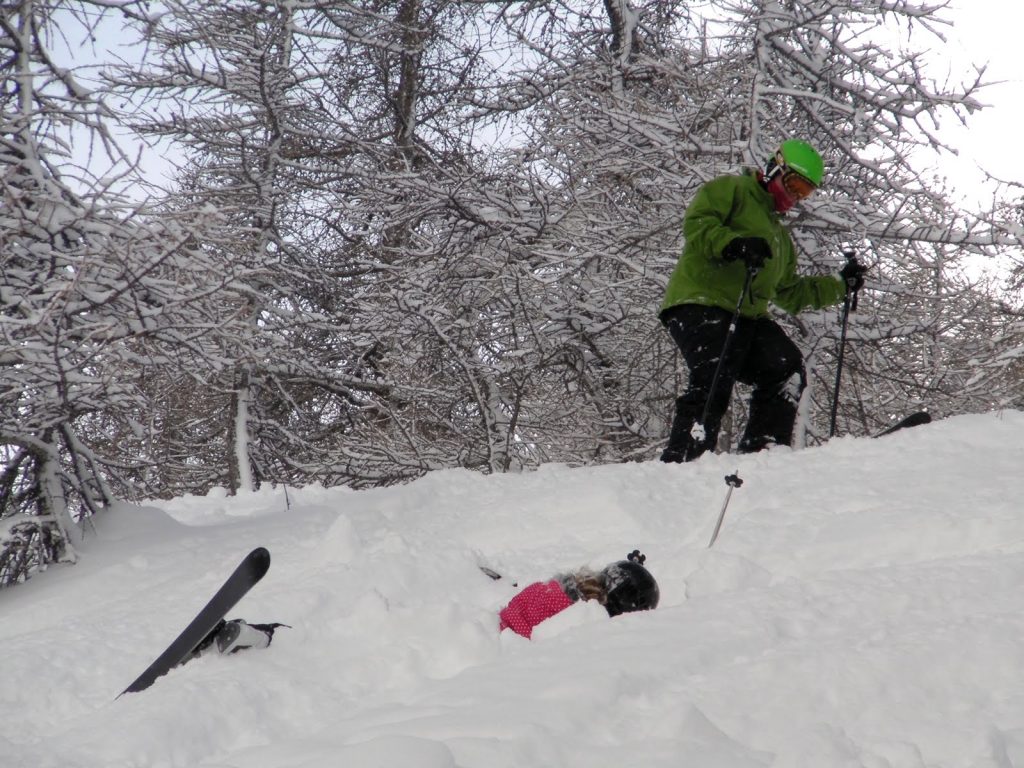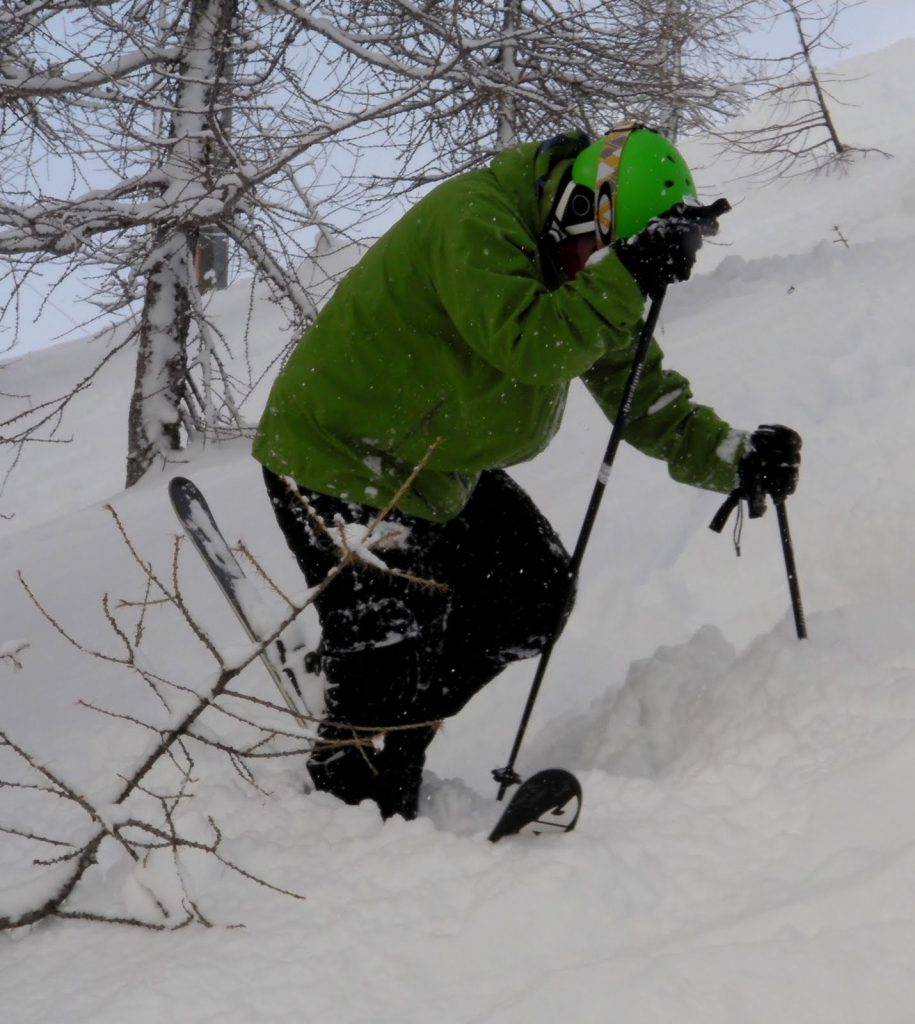Another slow opening on the mountain – took the bus around to La Daille and used the old, slow and cold – but reliable three-seat chair up to the Follie Douce. This was Olive’s first run beyond the nursery slopes and it was not ideal terrain for a beginner. With normal conditions Olive would have been able to handle this easily by now anyway – but the training had been extremely discontinuous due to the weather.
 Olive was prepared for the steeper terrain through a brief explanation of the very basics of dynamics – basically when the pitch is steeper move your body more quickly and with greater commitment into the turn. In this case I also suggested a bigger movement into the turn. I hadn’t said this to Olive earlier because it would have caused her to over-edge the skis (she had this tendency) – but now she had more of a natural pivot so increased dynamics would not present problems. Olive did very well and when the piste became narrower I added the “pushing forward” of the outside ski – and she immediately noticed that this tightened the turn radius. I explained how this pushing action makes the ski cut under your own trajectory more “proactively” and so makes the turn sharper. During this first ever descent of a proper run there was a steep narrow section where I asked for jump turns – just to ensure a proper pivoting action. Olive managed this well and Leonie practised it too. The run terminate with an excursion off-piste in deep snow – which was no problem to Olive with her little skis.
Olive was prepared for the steeper terrain through a brief explanation of the very basics of dynamics – basically when the pitch is steeper move your body more quickly and with greater commitment into the turn. In this case I also suggested a bigger movement into the turn. I hadn’t said this to Olive earlier because it would have caused her to over-edge the skis (she had this tendency) – but now she had more of a natural pivot so increased dynamics would not present problems. Olive did very well and when the piste became narrower I added the “pushing forward” of the outside ski – and she immediately noticed that this tightened the turn radius. I explained how this pushing action makes the ski cut under your own trajectory more “proactively” and so makes the turn sharper. During this first ever descent of a proper run there was a steep narrow section where I asked for jump turns – just to ensure a proper pivoting action. Olive managed this well and Leonie practised it too. The run terminate with an excursion off-piste in deep snow – which was no problem to Olive with her little skis. After a coffee break Luke and Ella came up the button lift to the Mont Blanc run and we started to work on increasing dynamics. I chose this because Ella had reverted to pushing her feet out – and the two things are mutually exclusive – you either move your feet or move your body. Ella found this tough to do in irregular un-pisted snow – probably because this snow is extremely unforgiving of any pushing outwards of the feet to the side! Going down through the trees in deep snow there were quite a few falls but also some brave attempts to use big dynamics to overcome the heavy packed snow. The skis can’t pivot in such heavy snow so exaggerated dynamics is the only effective way through.
After a coffee break Luke and Ella came up the button lift to the Mont Blanc run and we started to work on increasing dynamics. I chose this because Ella had reverted to pushing her feet out – and the two things are mutually exclusive – you either move your feet or move your body. Ella found this tough to do in irregular un-pisted snow – probably because this snow is extremely unforgiving of any pushing outwards of the feet to the side! Going down through the trees in deep snow there were quite a few falls but also some brave attempts to use big dynamics to overcome the heavy packed snow. The skis can’t pivot in such heavy snow so exaggerated dynamics is the only effective way through. After Lunch at the Frutiere Olive took a tired last run and then returned home by the Olympic Telecabine. Luke was working on his fore-aft movement, having worked out that his shin injury was due to being left behind – not due to coming too far forwards. Leonie was still unstable because she was rotating a bit and more importantly being lifted prematurely out of each turn by the skis (those aspects are linked). Leonie’s range of leg movement was also very limited. Luke was starting his turns with a rotation and being left in the “back seat” plus had postural problems with the outside hip being thrown outwards on the turn (linked to the initial rotation) and then twisting the spine the other way to try to compensate – and then standing on the inside ski as a result. Against a wall in the funicular building I demonstrated how the body should sink down into the turn and – how angulation is achieved by the altering relationship of the body to the mountain geometry (and gravity) – in this case by fixing the feet in position and then turning the body (instead of the other way around when actually on skis. Leonie understood this best and when following me was able to seriously increase her confidence and hence her speed – reducing rotation and so being able to sink down and keep the body inside the turn more effectively until coming up deliberately to complete the turn. Leonie was probably benefiting a lot from the clear feedback from her new ski boots. Luke with his need for a wide boot – and always having been fobbed off with “bigger” boots – had understood that the lack of appropriate feedback and support from poorly fitted and soft boots had eventually probably caused him to injure his shins. The lack of clear feedback and support is probably a major reason for developing the tendency to be “left in the back seat” – but now the correct new boots with clear feedback were helping him to understand why he was all over the place “fore and aft”. There is a strong tendency for the body to remain “vertical” instead of coming perpendicular to the slope – and good boots will certainly help to make this adaptation to the perpendicular.
After Lunch at the Frutiere Olive took a tired last run and then returned home by the Olympic Telecabine. Luke was working on his fore-aft movement, having worked out that his shin injury was due to being left behind – not due to coming too far forwards. Leonie was still unstable because she was rotating a bit and more importantly being lifted prematurely out of each turn by the skis (those aspects are linked). Leonie’s range of leg movement was also very limited. Luke was starting his turns with a rotation and being left in the “back seat” plus had postural problems with the outside hip being thrown outwards on the turn (linked to the initial rotation) and then twisting the spine the other way to try to compensate – and then standing on the inside ski as a result. Against a wall in the funicular building I demonstrated how the body should sink down into the turn and – how angulation is achieved by the altering relationship of the body to the mountain geometry (and gravity) – in this case by fixing the feet in position and then turning the body (instead of the other way around when actually on skis. Leonie understood this best and when following me was able to seriously increase her confidence and hence her speed – reducing rotation and so being able to sink down and keep the body inside the turn more effectively until coming up deliberately to complete the turn. Leonie was probably benefiting a lot from the clear feedback from her new ski boots. Luke with his need for a wide boot – and always having been fobbed off with “bigger” boots – had understood that the lack of appropriate feedback and support from poorly fitted and soft boots had eventually probably caused him to injure his shins. The lack of clear feedback and support is probably a major reason for developing the tendency to be “left in the back seat” – but now the correct new boots with clear feedback were helping him to understand why he was all over the place “fore and aft”. There is a strong tendency for the body to remain “vertical” instead of coming perpendicular to the slope – and good boots will certainly help to make this adaptation to the perpendicular.
Finally on this last day we had been able to get a reasonable amount of skiing done despite a late start.
